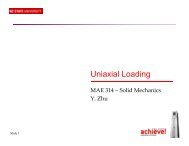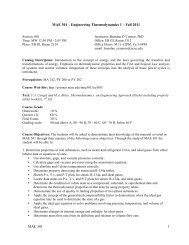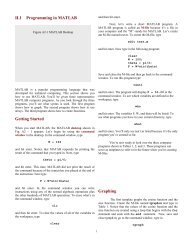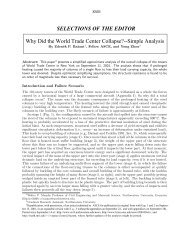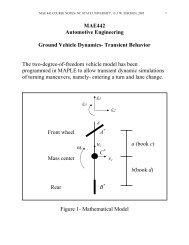The Online Ethics Center for Engineering & Science - Department of ...
The Online Ethics Center for Engineering & Science - Department of ...
The Online Ethics Center for Engineering & Science - Department of ...
You also want an ePaper? Increase the reach of your titles
YUMPU automatically turns print PDFs into web optimized ePapers that Google loves.
<strong>Online</strong> <strong>Ethics</strong> <strong>Center</strong>: Guidelines <strong>for</strong> Engineers Dissenting on Ethical Groundsbeen omitted, even if this leads to a substantial increase in the probability<strong>of</strong> a life threatening system failure. Under such conditions, there is atemptation to meet the deadline by skipping or shortening the tests. Suchdecisions might or might not be in accordance with company policy. Ifnot, then an engineer or manager objecting on ethical grounds usually hasan easier, but usually not easy, problem. <strong>The</strong> chances <strong>of</strong> resolving theproblem within the organization may be quite good. If the decision isconsistent with the views <strong>of</strong> upper management, then the problem is farmore serious <strong>for</strong> the dissenter. <strong>The</strong> following guidelines, based on theexperiences <strong>of</strong> many people, are designed to maximize the chances <strong>of</strong> afavorable outcome <strong>for</strong> the ethically concerned manager or engineer.Back to topOne should check out the alleged facts and technical arguments asthoroughly as possible. If feasible, get the advice <strong>of</strong> colleagues that yourespect. Carefully consider counter-arguments made by others. A goodway to ensure that you understand someone else's position, is to restate itto the satisfaction <strong>of</strong> that person. At any stage, if convinced that the otherperson's arguments are valid, do not hesitate to change your positionaccordingly.This does NOT mean that you must be able to validate your position withnear mathematical certainty. This is seldom possible in the real world. Inmost engineering work, we must operate with incomplete in<strong>for</strong>mationand make reasonable engineering judgments. For example, the engineersin the Challenger case could not PROVE that a launch would lead to adisaster. But, in such a situation it was sufficient to show that thelikelihood <strong>of</strong> failure <strong>of</strong> the O-ring joints was clearly too great withrespect to established safety standards. <strong>The</strong> burden was on the other sideto justify the launch--a burden that was not met.Back to top1. Establish a clear technical foundation2. Keep your arguments on a high pr<strong>of</strong>essionalplane, as impersonal and objective as possible,avoiding extraneous issues and emotional outburstsFor example, do not mix personal grievances into an argument aboutwhether further testing is necessary <strong>for</strong> some critical subsystem. Keepcalm and avoid impugning the motives <strong>of</strong> an opponent. (Of course, theremight be a situation in which the central issue is that an incompetentperson has been given critical responsibilities. In that case, it may benecessary to attack that person's qualifications. But this should be donewithout malice.) Try to structure the situation so that accepting yourposition will involve as little embarrassment as possible to those beingasked to change a decision. For example, you might be able to allow amanager to take credit <strong>for</strong> realizing that a course reversal was called <strong>for</strong>.Avoid overstating your case. Your credibility can be seriouslyundermined by exaggerated, invalid figures--even on matters not centralto the main issue.http://onlineethics.org/codes/guidelines.html (2 <strong>of</strong> 5)10/25/2005 9:15:59 AM




